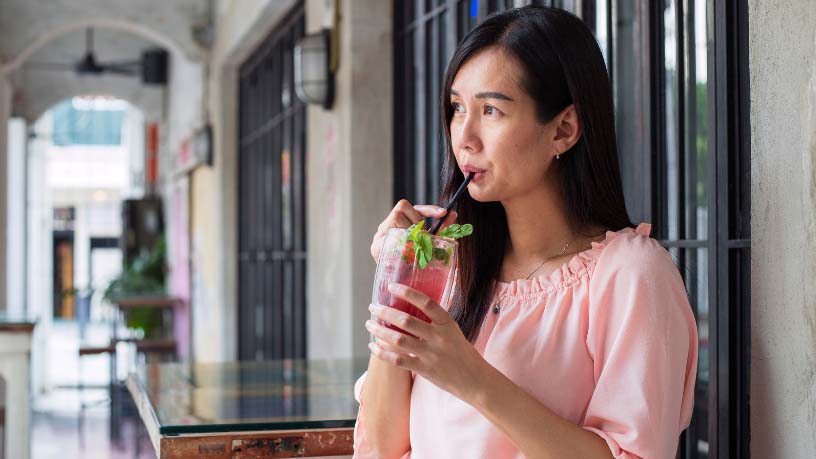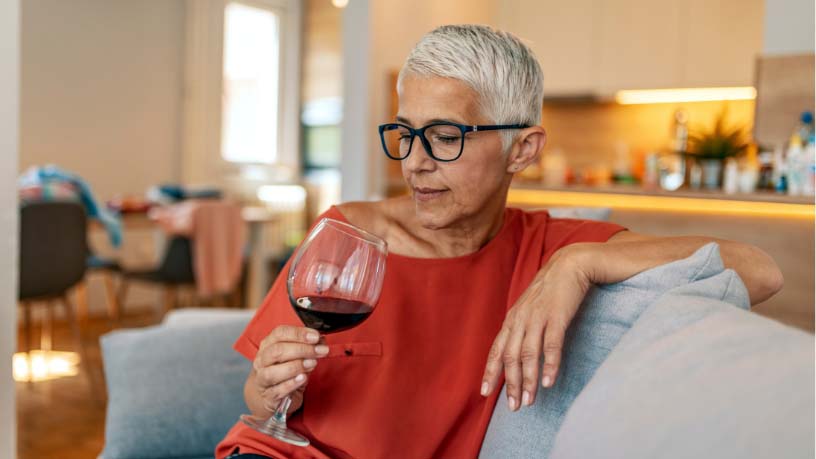On this page
- Stress and depression drove Greg’s drinking to harmful levels.
- An at-home detox program gave him the support he needed to stop.
- Sobriety has improved his health, mindset, and relationships.
Greg Stegman has always liked a drink. But a few years ago, when life got particularly stressful, his alcohol intake increased dramatically.
“Our house flooded while we were overseas, and we didn’t have any flood insurance,” says Greg, 75. “We had to pay a lot of money out of our savings. I was running my own business so had to work extra hours. I was working seven days a week, often 15 hours a day.”
Having a drink once it hit 6pm was just part of his routine.
“Alcohol had been part of my life for so long, it was just what I did,” he says. “But it increased. It went from being a bottle of wine every night, to 3 bottles a night.”
Drinking and depression
Greg had a history of depression and had traditionally relied on alcohol to get him through tough times.
“In 2013, I told my doctor that I thought I was depressed and drinking too much. He told me I just had to handle it. I was desperate to stop drinking, but I didn’t know how.”
Greg believes the culture of alcohol in Australia meant people didn’t really take him seriously. Around 1 in 3 Australian adults who drink exceed the recommended alcohol guidelines.1
“I never drank during the day, and I’ve always exercised and been body healthy but not mind healthy, so people didn’t really see a problem,” he says. “Men tend to joke about drinking. It’s very hard to have a heart-to-heart conversation if you’re struggling.”
The more stress he was under, the more Greg’s mental health suffered, and the more alcohol he drank.
“I’d wake up feeling awful, and say to myself, ‘please God stop me from drinking’. I felt terrible and I was desperate to get to some sort of clear minded state. Then at about 3pm I’d start feel better, and say to myself, ‘it’s only 2 hours before I can open a bottle of wine.’”
[Super: Greg is a Bupa Health Insurance customer from Brisbane, Australia] It’s hard for me to actually put into words, it’s like being rejoiced as a new soul when you wake up in the morning without a hangover.]
Title: Greg’s Story
I’m about to turn 74 fairly soon and I’ve been retired now for 10 years. I had my own business for most of my life.
About 10 years ago our house was flooded and I had no insurance. It cost us about $300,000. I was working 7 days a week, sometimes 15 hours a day. And I think to calm myself at nighttime I started drinking without any consequence.
And my wife said to me, she said ‘you’re drinking 2 bottles of wine a night, I think you need help’.
Well I’d been trying for a good year or so searching for a solution and I saw an ad from Clean Slate about giving up drinking, or controlling your drinking habits. You can do it through Blua.
[Super: Blua is digital healthcare from Bupa.]
Day 1, they said ‘well Greg, be prepared, you now have to stop drinking for a period of 3 months’. Straight away I thought well the first couple of weeks are going to be the hardest. But they’ve guided me all the way through.
On the video conference on a daily basis I was speaking to my nurse and she was pretty smart because she realised I was a binge drinker and I started drinking at 6 o’clock every night so she would purposefully start the video chats at 6pm.
I was fortunate enough to find a solution where I had to examine why I was drinking. This is a long journey, it’s not a short fix. But Clean Slate are right there to guide you, to pick you up and put you on the right direction.
[Super: The at home alcohol detox programme is available to eligible Bupa customers in Australia in partnership with the Clean Slate Clinic.]
They actually give you a small portable breathalyser and every time I’ve kept it at zero zero, which has been so rewarding. Because the reward is, you go to sleep at nighttime with a smile on your face and you wake up the next morning you’re feeling absolutely wonderful.
It’s now been around 7 months since I’ve taken control of my life thanks to Bupa and Blua. I see life differently. I now have a new life, a better life and a great life.
[End screen: Thanks to Greg for sharing his story. Individual experiences and outcomes will vary depending on personal circumstances. Speak to your doctor or health professional if you have concerns about your health.]
Finding sustainable help
Over the years, Greg had seen programs that claimed to help people stop drinking but was always sceptical.
“So many of them cost thousands of dollars and are overseas,” he says. “I didn’t think they would help me when I got home and was in my own environment again.”
Then, one day, he spotted an advert for an at home alcohol detox program. His health insurance meant he wasn’t out of pocket for any costs, reducing any further financial stress.
“I was given a nurse who guided me through the whole process,” he says. “We had daily video calls to start with. We talked about the reasons why I was drinking. It wasn’t a quick fix, but day by day I cut down on the alcohol. I was excited to do a week without drinking, then by week 2 I knew I wanted to do a month. It just went on from there.”
Safe, supported alcohol detox at home
Life without alcohol
Greg has been sober for 18 months and has never felt better. “I feel different,” he says. “I don’t overreact to things anymore, and I can control my temperament.
“I’m able to examine situations before acting in a forceful way. I know I’m a strong person now, I don’t need a crutch to get through tough times. The lows aren’t as low, and the highs aren’t as high. I’m on more of an even keel all the time.”
He is proud he’s showing his family and close friends how to take control of their lives. “I was worried about what they were seeing,” he says. “I feel like I’m setting them a good example now, and they are witnessing who I want to be.”
Greg’s advice for others
Resources
Clean Slate Clinic offers a range of treatments for dependence on alcohol, stimulants, cannabis and other drugs.
Alcoholics Anonymous offers free recovery programs around Australia.

At Bupa, trust is everything
Our health and wellbeing information is regularly reviewed and maintained by a team of healthcare experts, to ensure its relevancy and accuracy. Everyone's health journey is unique and health outcomes vary from person to person.
This content is not a replacement for personalised and specific medical, healthcare, or other professional advice. If you have concerns about your health, see your doctor or other health professional.
You might also like
How alcohol affects your body
That extra glass of wine you had last night may have more of an impact on your health than you realise.
Grey area drinking: When that extra glass is more than a treat
A nightly glass or 2 of your favourite drop to unwind can become harmful if you don’t know the signs of dependence.
The benefits of going alcohol free for a month
We all know drinking alcohol can have some pretty serious consequences for our health, but what happens when we stop drinking? Even just for a month?
5 mocktails for mindful drinkers
Going alcohol-free doesn’t mean you have to miss out on all the fun! Check out 5 of our favourite deliciously fruity and colourful mocktails.





